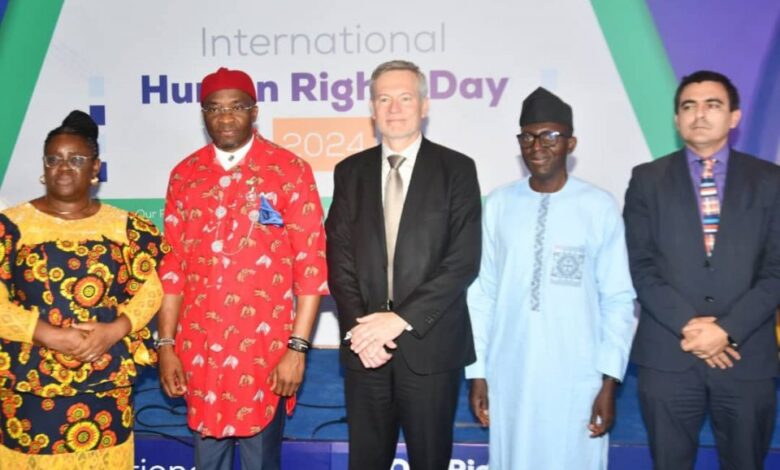EU Urges Nigeria To Strengthen Child Rights Protection

The European Union (EU) has called on the Federal Government of Nigeria to prioritize the protection of children’s rights and ensure they are safeguarded from all forms of discrimination, intimidation, and exploitation. Speaking at the 2024 International Human Rights Day event themed “Our Rights, Our Future, Right Now – Advancing Rights and Protection for Children in Nigeria”, EU officials emphasized the need for the effective implementation of the Child Rights Act across Nigeria.
The event, organized by the EU Rule of Law and Anti-Corruption Programme in collaboration with the International Institute for Democracy and Electoral Assistance, marked the conclusion of the 16 Days of Activism and the commemoration of International Human Rights Day.
EU’s Call for Action
Gautier Mignot, the EU Ambassador-designate to Nigeria and ECOWAS, highlighted the urgency of addressing the challenges Nigerian children face. While commending the adoption of the Child Rights Act (CRA) in most states, Mignot stressed that effective implementation remains the key issue.
“Every child, whether in Europe or elsewhere, should enjoy the same rights and live free from discrimination or intimidation. While the adoption of the Child Rights Act across all states, including the FCT, is commendable, effective implementation remains the key challenge,” Mignot stated.
He urged the government to increase funding for education, healthcare, and social services, ensuring these resources are accessible to all children, especially the most vulnerable.
Broader Commitments to Human Rights
Mignot also addressed the broader issue of gender-based violence, reaffirming the EU’s commitment to investing in prevention and protection measures. “At the European Union, we invest in prevention and protection—pillars fundamental to breaking the cycle of violence and safeguarding survivors,” he said, emphasizing the importance of collective efforts to promote human rights and social justice.
Domesticating the Child Rights Act
Deputy Speaker of the House of Representatives, Benjamin Kalu, added his voice to the call for action, urging the remaining 11 states yet to domesticate the Child Rights Act to do so without delay. He expressed deep concern over the prevalence of child labour and systemic failures in enforcing children’s rights.
Citing the National Child Labour Survey of 2022, Kalu revealed that 24 million of Nigeria’s 62.9 million children are engaged in child labour, many under exploitative and hazardous conditions.
“Despite legislative milestones such as the enactment of the Child Rights Act in 2003, children in Nigeria continue to face significant challenges, including abuse, neglect, exploitation, and systemic failures in rights enforcement,” Kalu lamented.
A Joint Call for Progress
Both the EU and Nigerian representatives called for urgent and collaborative efforts to address these challenges. They emphasized the need to eradicate child labour in alignment with the Sustainable Development Goals and to promote a culture of human rights to ensure a safer and equitable future for all children in Nigeria.



